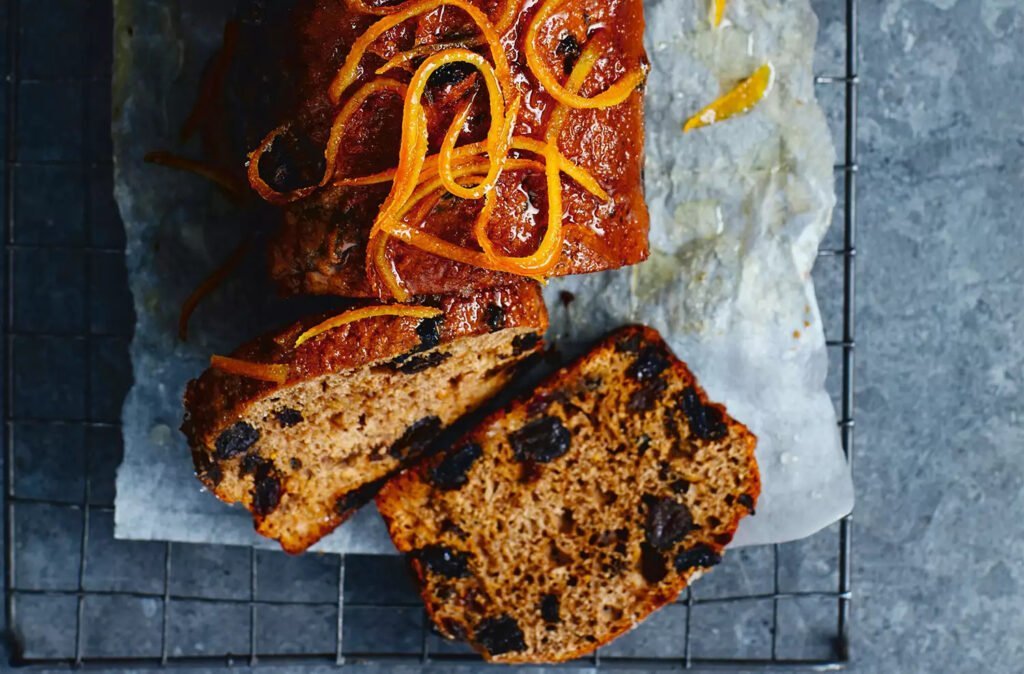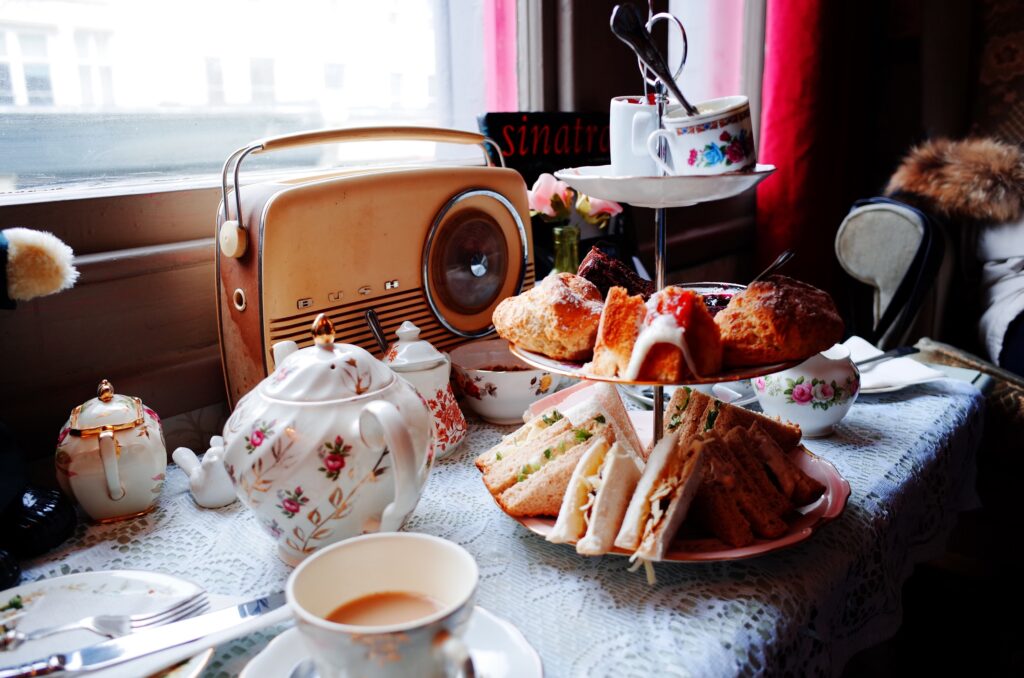Get your butter, sugar and eggs at the ready – it’s time for my favourite tea cake recipes! These five recipes that I have hand-selected from across the web are perfect for afternoon tea. You can bake these up in the morning (or even the day before) to have with a cup of tea in the afternoon.
Several of these recipes also contain tea as an ingredient, to add a subtle malty tea flavour to the cake.
Along with some suggestions of other foods to serve at afternoon tea, you can find some FAQs at the end of this article. Don’t forget to take a look at the tea-ware shop at Immortal Wordsmith for the perfect equipment to host your afternoon tea with.
Delicious Recipes for Afternoon Tea
A tea cake recipe is very popular for afternoon tea. A traditional English tea cake is actually like a fruited bread bun. Made with yeast and containing dried fruit, it is shaped into a round bun and baked in advance. When you want to eat it, you slice it in half, lightly toast it, and heap on the butter and jam.
Tea cakes are often confused with hot-cross-buns (fruited buns that are popular at Easter) and tea loaves like the Faversham tea loaf, even in the UK! This is because there are numerous variations on the tea cake. Depending on where you are in England, your tea cake may be fruited, wholemeal, flavoured with hops, or even used as sandwich bread.
Along with one of the tea cake recipes below, I recommend serving some savoury options with your afternoon tea. Read my article What to Serve with Afternoon Tea to learn more.
5 Star Tea Cake Recipes!
These five recipes are rated 5 stars online and are from trusted sources. Serve any with a cup of my favourite afternoon tea (this BOH Tea blend) for a satisfying afternoon snack.
1. Traditional Tea Cake Recipe


BBC Good Food has some bad recipes floating around their database… but where they usually shine is with traditional British foods. Their simple teacake recipe is one of the best! The recipe makes 6 tea cakes and requires yeast, fruit, spices and typical baking ingredients. You don’t need a bread maker.
I recommend freezing any teacakes that you won’t use, as splitting the recipe in half to make a smaller batch is difficult given that only 1 egg is needed. The recipe also uses butter and milk, so it’s not suitable for vegans. Substituting these ingredients is possible, but I can’t vouch for the end results.
Some commentors recommend adding more fruit and spices, so if you like a particularly fruity and flavoursome teacake, use 100g of dried fruit and 1 tsp of mixed spice. If you don’t have any mixed spice, you can use pure cinnamon or a homemade mix (cinnamon, allspice, nutmeg, cloves, dried ginger, etc.) to taste.
2. Dried Fruit Tea Cake Recipe


Another popular “tea cake” to have with afternoon tea is a heavily fruited loaf-style cake. This one is made with dried fruits and tea. I personally love recipes like this, particularly when they are heavily laden with sultanas. The maltiness of black tea with the sweetness of sultanas and a brown sugar cake mix is divine.
For a dried fruit tea cake recipe, I recommend Waitrose Fruity Earl Grey Tea Loaf. It’s a dark and malty tea loaf that’s flavoured with Earl Grey tea and orange. This combination is a classic – many tea brands combine Earl Grey with orange naturally, including Twinings Lady Grey.
The recipe uses dark brown muscovado sugar, but you can substitute this for any brown sugar that you like. I prefer a 50/50 mix of light brown and dark brown soft sugar, and golden sultanas rather than a fruit mix. Don’t skip the orange syrup and orange rinds – they really make this recipe stand out.
3. Cinnamon Spiced Tea Cake Recipe


Soft and crumbly, this cinnamon tea cake is the most cake-like of all the bakes on my list. It is neither a loaf nor a bread bun, but a deliciously sweet and cinnamon-flavoured cake to eat with a cup of tea. The cake itself is beautifully simple – the recipe is from Jess at Sweetest Menu.
While the cake is still warm, it’s topped with a melted butter, cinnamon and sugar glaze. You can actually eat it warm too, which is absolutely delicious! The recipe makes 1x 8-inch round cake but you could adapt it to make mini muffins or cupcakes instead – just reduce the time and check with a skewer to see if they’re done.
Cinnamon is the only spice used in this recipe, but you could potentially substitute the teaspoon of cinnamon for any other spice. If you have a jar of gingerbread spice or a festive spice mix, this recipe would be great for it too.
4. Unusual Tea Cake Recipe


When I think of English foods, particularly fruits, rhubarb is up near the top. Along with cooking apples and wild blackberries, rhubarb comes with an extra helping of nostalgia with every bite. That’s why I really love this unusual Earl Grey Tea and Rhubarb Loaf Cake by Sneaky Veg. The recipe combines rhubarb, dried fruits and earl grey to create a rich and malty loaf.
Rhubarb is quite a tart fruit, so it goes really well with the sweetness of the cake loaf. You can definitely switch out the Earl Grey for a sweeter black tea too – an Assam tea would be suitable. I recommend Twinings Assam.
Unlike many other tea cake recipes, this one is dairy free. You can substitute the egg for a flax egg too if you’d like to make it vegan. Make sure you start this recipe the day before you need it. You will need to roast or stew your rhubarb, then soak it in the tea along with the sugar and dried fruits overnight before you can mix it all up.
5. Chocolate Marshmallow Tea Cake Recipe


Last on our list is super unusual, but another British classic. The Tunnock’s Tea Cake is a mound of marshmallow fluff atop a crunchy biscuit and domed with chocolate. 0% cake, 100% delicious! These are readily available in British supermarkets, and you might be able to find it in British corner shops and international stores around the world.
If you would like to make one of these moreish chocolate tea cakes at home, I recommend the recipe by Delish. It makes a coffee-flavoured marshmallow, but you could substitute this for powdered tea. Alternatively, just remove it entirely for delicious, sweet vanilla marshmallow instead.
These treats are great for afternoon tea, particularly for kids that want a chocolatey treat rather than something laden with fruit.
FAQs
Numerous cakes and sweet breads are named ‘tea cakes’ as they are consumed alongside a cup of tea – usually afternoon tea. In the UK ‘tea’ can also refer to an evening meal, when the cake or bread will be consumed.
Both traditional tea cakes and hot cross buns are spiced, fruited bread buns that are eaten with a cup of tea. However, the hot cross bun is designed with a white cross over the top and is usually consumed around Easter or on Good Friday.
A scone is made with a raising agent, like baking powder, while tea cakes are more bread like and are made with yeast. Both are sweet and often served with a cup of tea.
It is closer to a cake than a biscuit, although technically it is a bread bun as it is made with an enriched dough containing yeast.
A tea cake is made of an enriched bread dough, with yeast, butter and sugar. It usually contains mixed dried fruits or sultanas and a small amount of mixed spice.
Most cakes go well with tea. For afternoon tea, a fruity loaf cake is a great choice. A lightly spiced moist sponge is also a good choice.
